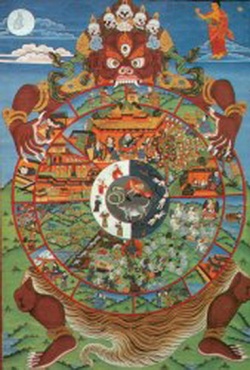Funerals
A funeral (matakicca) is a ceremony related to disposing of the body of someone who has died. Funerals for ordinary people at the time of the Buddha were fairly simple. Four men would carry the body to the charnel ground (susāna) followed by a procession of relatives and friends who would be carrying torches and weeping and wailing (Ja.VI,464; Sn.580; Tha.779). The usual way of disposing of the body was by cremation or exposure to the elements. If the first of these was done, the body was placed on the pyre (citaka), flowers, incense and garlands were placed on the body, the participants circumambulated the pyre three times and then it was ignited. On the 12th or sometimes the 13th day after the death, the saddha ceremony was held where food, clothing and other gifts were given to brahmans in the name of the deceased (D.I,97). The Buddha’s funeral was arranged by the Mallas, the people of Kusinārā, and was conducted in a way similar to the royal funerals described in the Rāmāyana and other later literature. The Mallas erected tents and awnings and spent several days honouring the Buddha’s body with incense and garlands and to the accompaniment of music and dancing. After six days of this, they washed their heads, dressed in new clothes and then put the body in an iron coffin, smeared it with oil and wrapped it in several layers of fine cloth (D.II,161-4). Then the body was taken through the town, out through the east gate and then cremated. The ashes of eminent people were usually then interned under an earthen mound (thūpa), often situated at a crossroads (cātummahāpatha). In the case of the Buddha, his ashes were divided into eight, each portion being placed in such a mound. Today, different Buddhist cultures conduct their funerals in different ways, from simple and dignified as in Sri Lanka, to elaborate and colorful as in Thailand. In China and Vietnam, the bodies of esteemed monks are sometimes mummified, and, in Tibet, the bodies of ordinary people are sometimes dismembered and fed to vultures. See Doṇa, Grief and Stūpa.
